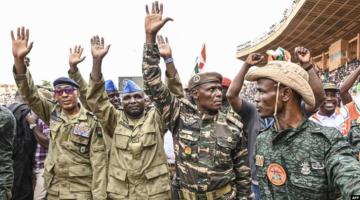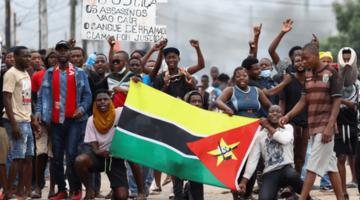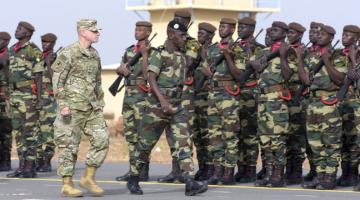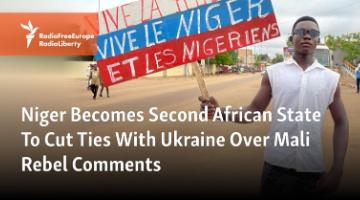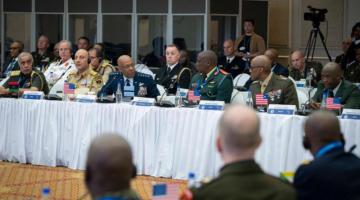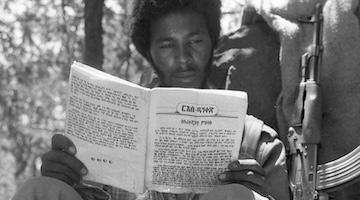Migrants rescued near the Libyan coast. (Photo: AFP)
Libya exemplifies the terrorism inflicted upon African nations by US/NATO imperialism. Twelve years after the Libyan state was destroyed it is still under sanctions which devastate that country. Essam Elkorghli delivered these remarks during the Black Alliance for Peace 2023 African Liberation Day webinar.
African Liberation Day, though it is a festive day to remember and remind us of the struggles Africans across the globe have endured to liberate themselves from the chains of slavery, colonialism and imperialism, today it brings with it the necessity for renewed analyses of contemporary imperialism that is alive and well. Ultimately, the goal is to highlight how modern imperialism functions and how its reverberations are felt beyond the nation state.
Situating Libya vis-á-vis imperialism
Libya is situated in Northern Africa, and like many of the African countries, it is blessed with numerous natural resources. These resources were alien to the people upon the country’s independence in 1951, such that Libya continued to seek aid from the West in return for preferable oil contracts and the presence of the largest NATO base outside of the NATO orbit (Wheelus Airbase in Tripoli, the capital). When the Libyan Revolutionary Command Council toppled the monarchy in 1969, it took on a national developmental project that echoed the Pan-Arab zeitgeist of the era: nationalizing of natural resources, closing of all forms of foreign military bases and presence, and a socialist orientation for national development. This resulted in an increase in the human development index due to the expanded public education, health care, and other social services.
Given Libya’s recent history under the Fascist Italian rule, the Libyan genocide made Libya a country with a small population and massive land and oil wealth. Given such a social and economic structure, the leadership of the country expanded its socialist project and national liberation to other territories, such as Northern Ireland, South Africa in the apartheid era, and Nicaragua’s Sandinista government, and most importantly Palestine. The combination of dismissing foreign troops from the country, nationalizing natural resources, and confronting the West in territories where the latter funds terrorists and reactionary regimes (e.g., Taliban in Afghanistan and apartheid in South Africa and Palestine), Libya faced crippling sanctions that were meant to bring internal destabilization and dissatisfaction with the leadership of the country.
Whereas liberal narratives on the human impact of sanctions as a collective punishment often frame the hardships as side-effects of the sanctions, they truly target the general population. In Libya, the sanctions damaged the country’s currency exchange, the aviation sector, medical sector, and educational sector. For example:
- When Libya needed to buy medicine or medical equipment, they often had to transact with US dollars. Given these transactions are monitored by the US, they were deemed illegal. The Libyan state had to go through intermediaries who furtively completed the multilateral transactions while usurping value drain, making the state pay nearly five times more of the original price.
- The inability to import spare parts for airplanes had a catastrophic result on the aviation sector, such that a civilian airplane crashed due to the sanctions.
- The spare parts for printers were also sanctioned, making the state unable to print its own textbooks and needing to import them from abroad, resulting in further draining of foreign reserves. And Libyan students were barred from studying in the sanctioning countries and particularly studying certain subject areas that the US deemed as a national threat.
The Libyan state’s isolation from the world during the 1980s and 1990s, pushed it to consolidate its African orientation and on September 9,1999, the African Union was established in Sirte, Libya. The following years saw Libya hand its chemical weapons program in return for the lifting of the sanctions.
Imperialism and the imposition of unipolarity
Despite the reproachment and reintegration with the West vis-á-vis international market, the state continued to have its liberation orientation when it comes to national development, particularly South-South cooperation. Libya developed various investment portfolios in Africa, and as it planned to develop its national infrastructure and military, it sought contracts with largely Global South countries and kept the Americans, British, and French at bay. Following the signing of railroad construction between the Libyan state with China and Russia, a US embassy cable leak in 2008 reads, “The fact that an operator with Bechtel's savvy and deep pockets was ultimately unable to secure its contract serves as a cautionary tale for the many U.S. and western companies seeking to enter Libya's booming market.” The idea that an independent state using its surplus for the benefit of the non-imperialist orbit threatens that particular order.
It is crucial to center the imperialist question in the 21st century. Imperialism is not a populist slogan uttered by Global South leaders to usher support, nor is it about cross-border skirmishes. Imperialism is a financial term that explains how the relationship of dependency — that is, the periphery exporting raw materials to be transformed to overly priced consumer goods by the core, where the surplus value (i.e. profit) is usurped by the core — is maintained, while simultaneously forcing the integration of the periphery with the core, by all means necessary, including militarily. In other words, it means global monopoly, in terms of liberal international order, with a single hegemonic currency, and proliferating imperialist wars.
Imperialism is alive, and thanks to the work of Julian Assange and Wikileaks, the long-planned toppling of the Libyan regime is delineated in Hillary Clinton’s emails that supplanted Libya’s investment in the Pan-African currency that was meant to be backed by African gold to contest the US-dollar hegemony and “provide Francophone African Countries with an alternative to the French Fran (CFA)”. Her emails also show how adroitly successful the imperialists are in planning for the dismantling of Global South nationalist states, such that France’s investment in the destruction of Libya will result in gaining “a greater share of Libya production… Increase French influence in North Africa… Provide the French military with an opportunity to reassert its position in the world… Address the concern of his advisors over Qaddafi's long term plans to supplant France as the dominant power in Francophone Africa” which are objectives we have seen France accomplish in the past last decade.
Libya & Africa after NATO’s onslaught
Despite the 2011 sanctions on the Libyan state were articulated to mean that they targeted the regime for committing genocide against its people, the sanctions continue till our very day. International transactions are made difficult, while the frozen assets of the Libyan Investment Authority are being nationalized and or sold cheaply.
Militarily, NATO countries are operating in the Sahara and south of the Sahara countries, and declared Africa its Southern Neighborhood, mirroring the US Monroe Doctrine and how it treats its neighbors in Latin America. In Libya, there are more than 20,000 foreign troops occupying different military bases. Meanwhile, AFRICOM expanded from operating in just two countries in 2011, to nearly 50 countries in 2023. Despite the increased military operations of NATO and AFRICOM, there has only been a noticeable increase in terrorist activities wherever they operated.
It is worth highlighting that AFRICOM operations are tied to the US expansive military policy to subjugate the continent to its will, and the tale of Alex Saab is worth highlighting. The Colombian national was transferring aid from South Africa to Venezuela via Iran to circumvent the sanctions, when his plane was downed by AFRICOM in Cape Verde and he was forcefully extradited to the US. This is not an isolated incident because the local Libyan militias kidnapped a Libyan citizen, Mas’ud Abu Ajila Al-Marimi, 74, from his home and handed to the AFRICOM troops operating in Misratah (200km east of Tripoli) for him to face trial in the US based on allegations that he played a role in the Lockerbie bombing of 1988 – despite there is no extradition agreement between Libya and the US. Other crimes by AFRICOM have been documented in Libya and other countries.
The planned destruction of Libya should not be looked at through a methodologically nationalist lens because it would be remiss to overlook the impact of NATO onslaught on the region. After pumping the country with millions of weapons to overthrow the regime in 2011, these weapons trickled to Saharan states where there has been an increased instability since then.
The events in Sudan intertwine with the ramifications of imperialism. Lest we forget, in 2011, the then-president of Sudan, Omar Al-Bashir, was on the International Criminal Court wanted list. AFRICOM and NATO saw no issue with giving weapons to Al-Bashir for him to smuggle through the Sudanese-Libya border for it to reach the rebels who were fighting to overthrow the Libyan regime. As NATO armed the Libyan rebels, they also flew a Libyan exiled military man whose name is Khalifa Haftar, a CIA asset in Libya who is now in charge of the Libyan army. When he wanted to take over Tripoli in 2019, the Rapid Support Force (RSF) of Sudan, funded by the functionary of imperialism — United Arab Emirates — sent weapons and soldiers to aid Haftar. His plans failed because Italy and Turkey (both NATO members) had alternative interests in the country, and they supported the sitting government in Tripoli. Now, Mr. Haftar is paying back the service to the RSF in Sudan as they are fighting the Sudanese Army. This is to highlight that the destruction of one country can have lasting reverberations on the whole region.
Libya no longer has a national security apparatus that acts independently without foreign meddling. The influential militias (particularly, Libyan Coast Guard) that are leading smuggling and human trafficking economies are sanctioned by the UN, but they also receive EU’s funding and training as part of the Frontex operation that is meant to control the flow of migrants through the Mediterranean. This is a testament to how imperialism integrates periphery countries into the imperialist orbit based on a relation of dependency, and in this case, security dependency.
This is the impact of imperialism on Libya and its repercussions across the African continent. The lessons of history are crucial for any genuine movement that calls for the liberation of the continent from further balkanization and subordinated integration. It is the time for us to engage with the burgeoning multipolarity that surpasses US hegemony and envisages an alternative world beyond unipolar dominance. In the words of Thomas Sankara, “You cannot carry out fundamental change without a certain amount of madness. In this case, it comes from nonconformity, the courage to turn your back on the old formulas, the courage to invent the future. It took the madmen of yesterday for us to be able to act with extreme clarity today. I want to be one of those madmen. We must dare to invent the future.”
Essam Abdelrasul Bubaker Elkorghli is a Libyan PhD student at the University of Illinois at Urbana-Champaign, researching Libya’s modern political history and contemporary imperialism in education. He is a local labor organizer with the graduate workers union at his university and is a member of the Global Pan-African Movement.


